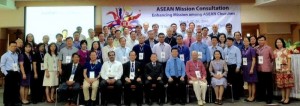Sub-regional Consultation Affirms Transforming Churches Mission in Southeast Asia
[caption id="attachment_1732" align="aligncenter" width="778"] Participants at ASEAN Mission Consultation[/caption]
Participants at ASEAN Mission Consultation[/caption]
As churches of Asia, especially in the Southeast Asian sub-region, have common history in areas of mission and ecumenical cooperation for decades, increased ecumenical engagement should be further strengthened for proclamation of the good news of the Gospel of Jesus Christ, opined the participants of a sub-regional consultation organised by the Church of Christ in Thailand (CCT) from 27-30 March 2016.
The consultation focused on the theme ‘Enhancing Mission among ASEAN Churches,’ and brought together 62 participants from eight Southeast Asian countries.
In a keynote address delivered at the opening session of the consultation, Dr. Mathews George Chunakara, General Secretary of Christian Conference of Asia (CCA) said that, “it is an imperative that churches in Asia should envision new praxis and identity for mission in multi-religious and pluralistic contexts, as well as within the social and cultural gamut in Asia.”
In a communiqué adopted towards the end of the consultation, the participants affirmed that, “we commit ourselves to being worshipping and transforming churches to become relevant in our communities and areas of ministry through establishing and strengthening relationships in the community, engaging in evangelistic tasks and social services to the community”.
The communiqué further stated that “we affirm our commitment to be messengers of Christ and work for his mission to bring “the fullness of life” (John 10:10) to the people in a region that is fraught with challenges. We will seize this moment of Kairos and work for healing and wholeness and help in creating welcoming communities that fully respect the rights and God-given dignity of the people”.
The participants hoped that “our conversations can be a prelude to the Asia Mission Conference that will be organised by the Christian Conference of Asia (CCA) in 2017”.
The consultation discussed on various issues compelling the churches to engage further in dialogue and enabling them to meet the challenges together, as churches in Southeast Asia are faced with grave issues, especially poverty, disparity, human trafficking, negative impacts of climate change, denial of the rights of indigenous groups and minorities.










